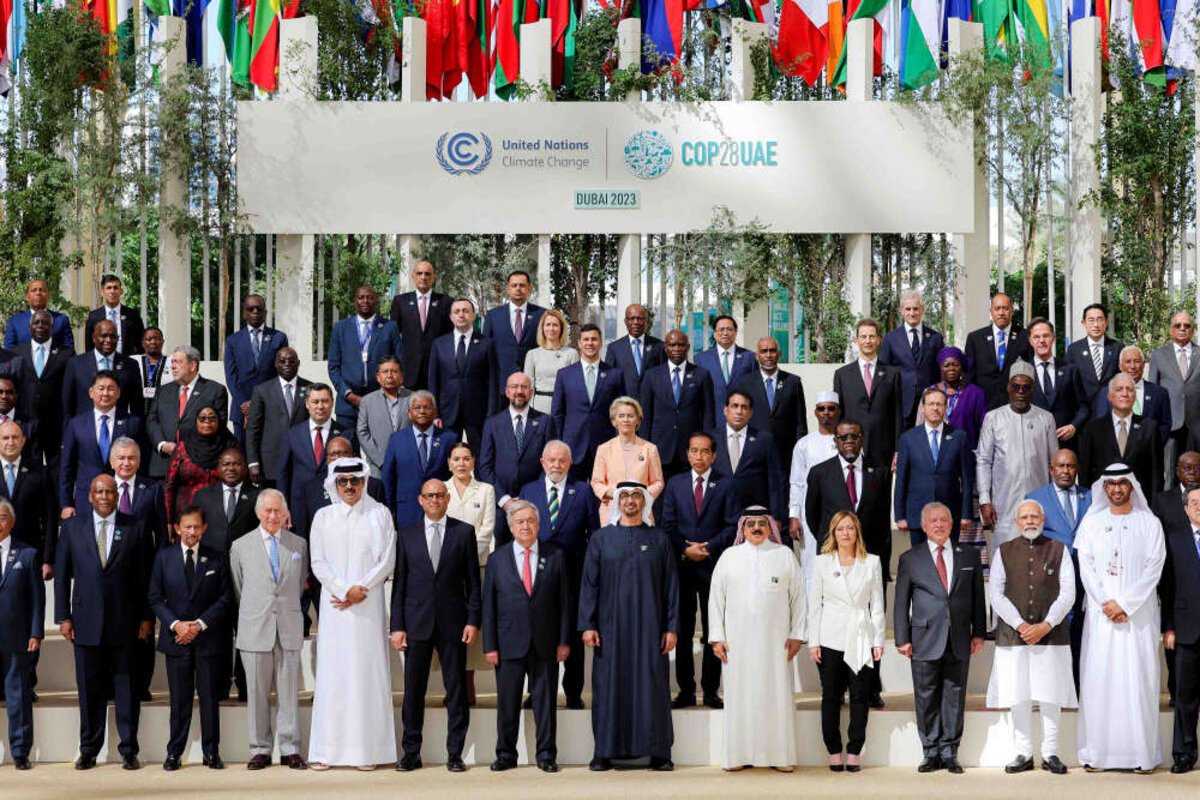
The 28th United Nations Climate Change Conference (COP28) took place in Dubai from November 30 to December 12, 2023.
During this pivotal Conference of the Parties (COP), nations collaborated to unveil the 'United Arab Emirates (UAE) Consensus', marking the most ambitious and comprehensive set of negotiated outcomes to arise from the United Nations Framework Convention on Climate Change (UNFCCC) process since COP21 [1].
A fundamental element of the UAE Consensus involves a decision on the Global Stocktake (GST) aimed at evaluating progress since the Paris Agreement and outlining a strategy to address implementation gaps until 2030 [2].
Notably, this groundbreaking agreement introduces a sectoral approach to the COP process, urging participating parties to shift away from fossil fuels in a just, orderly, and equitable manner to achieve net-zero emissions by 2050. However, the agreement has been met with mixed reactions, with some considering it a historic breakthrough and others seeing it as a failure for global climate action [3].
The consensus further advocates tripling renewables and doubling global energy efficiency from 2% to 4% a year by 2030. Achieving a threefold increase in renewables implies the necessity of installing 11 gigawatts of capacity by the year 2030. Energy conservation and efficiency have the potential to achieve a reduction of 4 gigatonnes, contributing to the necessary savings we aim to achieve by 2030 [3].
It emphasizes the imperative of peaking global emissions by 2025, considering diverse national starting points, and encourages the submission of economy wide Nationally Determined Contributions (NDCs) by countries. All signatory countries are required to submit an updated NDC every five years, with the next round of updated NDCs required to be submitted by 2025. This will help countries demonstrate their commitment to the Paris Agreement and showcase their efforts in mitigating climate change [4].
COP28 has seen the emergence of several voluntary pledges, focusing on areas such as hydrogen, cooling, green procurement for heavy emitters, fossil energy producers halving their operation emissions by 2030, health, sustainable agriculture and food systems, and more coordinated national and subnational climate action [2, 5].
Additionally, the decision underscores the critical need to substantially increase adaptation finance beyond doubling to meet urgent and evolving needs. It explicitly calls for countries to submit National Adaptation Plans by 2025 and implement them by 2030. The annual financing shortfall for adaptation is as much as $366 billion, compared with the $25 billion provided during the 2017-2021 period [6]. These plans aim to address the impacts of climate change and help vulnerable countries safeguard their communities.
In fact, even if we stopped all emissions today, accelerated adaptation is still needed to respond to the devastating climate impacts already being experienced [7]. COP28 also supports an ambitious replenishment of the Green Climate Fund [8].
Finally, recognizing the pivotal role of finance in achieving ambitious goals, the GST decision propels omentum toward establishing a new global climate finance architecture to support the post-2025 climate objectives, expected to be finalized at COP29 [1].
Overall, the COP28 agreement is a step in the right direction, but it has been met with mixed reactions due to its loopholes and lack of ambition in addressing the climate crisis. The next UN climate summit, COP29, will take place in Azerbaijan, and it will need to address the issues that were not resolved at COP28 [9].
References
[1] COP28 UAE, Everything You Need To Know On The UAE Consensus
[2] Bouramdane, A.-A., "Africa’s Vulnerability and the Road Ahead from COP27 to COP28", énergie/mines, 2023, URL: https://energiemines.ma/africas-vulnerability-and-the-road-ahead-from-cop27-to-cop28/
[3] Reuters, A COP Where the World Finally Faced Up to the Need to Wean Itself Off Fossil Fuels, https://www.reuters.com/sustainability/climate-energy/cop-where-world-finally-faced-up-need-wean-itself-off-fossil-fuels-2023-12-15/
[4] Backer McKenzie, COP28: The Global Stocktake, https://www.bakermckenzie.com/-/media/files/insight/topics/cop/cop28-briefing-paper-one.pdf
[5] IDDRI, COP28: The Moment of Truth, https://www.iddri.org/en/publications-and-events/blog-post/cop28-moment-truth
[6] Reuters, COP28 Calls for Adapting to Warmer World Without Without Resolving How to Pay, https://www.reuters.com/business/environment/cop28-calls-adapting-warmer-world-without-resolving-how-pay-2023-12-13/
[7] Bouramdane, A.-A., "Pourquoi l’Atténuation et l’Adaptation aux Changements Climatiques sont Complémentaires ?", énergie/mines, 2022, DOI: 10.5281/zenodo.7594404. URL: https://energiemines.ma/pourquoi-lattenuation-et-ladaptation-aux-changements-climatiques-sont-complementaires/
[8] COP28 UAE, UAE Leaders' Declaration On A Global Climate Finance Framework, https://www.cop28.com/en/climate_finance_framework
[9] Climate Home News, We Have to Fix Unfairness: Ten Takeaways From COP28, https://www.climatechangenews.com/2023/12/15/we-have-to-fix-unfairness-ten-takeaways-from-cop28/





